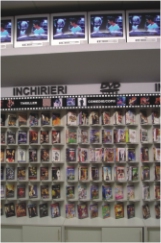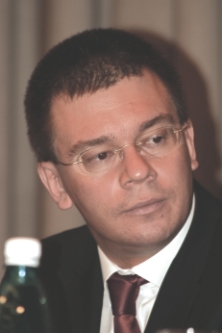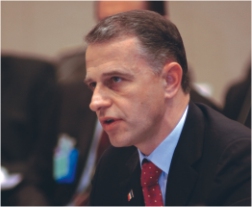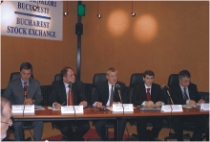Major growth industries: Fraud and stolen goods
 A national appetite for top brands and the latest games and movies are still forcing the majority of cash-strapped consumers to turn to the black market. But, as Ana-Maria Smadeanu investigates, they rarely receive a fair deal A national appetite for top brands and the latest games and movies are still forcing the majority of cash-strapped consumers to turn to the black market. But, as Ana-Maria Smadeanu investigates, they rarely receive a fair deal
Marcel and Claudiu sell stolen and fake goods. They have a web-site with products on offer advertised as 'The best sporting equipment at the best prices'. But chatting to Marcel over the phone reveals that he has an even greater selection of top-brand trainers at tempting prices.
“I can't demonstrate if they are original or not,” he says. “But bring your own Nike shoes and compare them with mine, then we will see.”
His friend Claudiu says the goods come from Holland. “Some of the shoes are fake, but others are original. Anyway you can't notice the difference. I sell the fakes from China for 1.6 million lei [44 Euro] per pair. Originals sell for 1.8 million lei [49 Euro]. I also sell T-shirts and track-suits.”
The aim of hawking stolen goods should be to sell them for cheaper than on the market. But not here. Perfumes are more expensive than in high street stores, a 75 ml Yssey Miake in Ina Center or Beauty Shop is no more then 1.8 million lei [49 Euro], but Marcel and Claudiu sell it for 55 Euro.
Romania is a retail market rather than a producer of counterfeit products. The piracy of software, CDs, DVDs, perfumes, clothes and shoes are favorites, as well as jewellery, watches and illegal diplomas. Around 60 per cent of brands on the Romanian market are fake, second only to Ukraine in European counterfeit stakes, according to monitoring and lobbying group The Romanian Association for Fighting Against Counterfeit Products (ARCC).
“The violation of the copyright law can be punished with jail or penalty,” says ARCC's president Dan Drogan. “But the laws are hardly ever applied.”
A large number of fake brands arrive through Russia and the Republic of Moldova and some retailers claim the police, independent financial auditors and the border guards are not doing enough to prevent this flood.
Clothing store Cap D'opera says the most counterfeited of its brands are Versace and Cavalli. This especially erodes the retail of products with clear logos on the front of T-shirts. “Our customers do not want to buy logo t-shirts anymore,” says manager Tetrhashvili Shlomo, who adds: “if there weren't smugglers, we could sell twice as much.”
Official distributor of Nike products, Greek firm Elmec, has 20 stores locally and aims to bring the licenses for Energy, Miss Sixty and Converse to Romania. Except for its merchandise, the firm believes 99.9 per cent of Nike products coming into the country are counterfeit. “The market of fake sport shoes is very developed,” says Ilias Kalamaras, Elmec's general manager in Romania. “90 per cent of the fake branded shoes are made in China, which are cheap and similar to the originals,” he adds.
“Elmec spends 100,000 to 120,000 Euro yearly to stop smuggling. Last year we confiscated 100 pairs of fake Nikes. When Nike merchandise comes in the country, customs officials contact us and we travel there to check it.”
With smuggled goods into the country, image is also a casualty for brands. Alessandro Amato, owner of Jewellery retailer Sodo Migliori Romania says, from his perspective, Calvin Klein watches and Swarovski cut crystals are the most common contraband items. “This brings a 15-20 per cent loss to our image," he claims.
The ARCC says, apart from the felons, everyone loses from smuggling and counterfeit goods, including brands, the state (because of the loss on VAT) and buyers who purchase poor quality products at low prices that do not satisfy their needs. In food and medicine, the products can be a danger to a consumer's life.
But it is hard to keep up with the sophistication of this well-organized system, especially in the virtual world. When a new product not yet launched on the market in music, film or games finds its way into the hands of a smuggler it can be disseminated around 10,000 websites in less than half a day.
The sales of counterfeit CDs and DVDs is around 85 per cent of the total market size, argues Eusebiu Vasilescu, manager of general retailer Diverta. He says action is finally being seen through the creation of 'authorized' dealerships. “But if we did not have to fight the smugglers our market would increase by 40 per cent,” he adds.
But high global prices are also pushing low income consumers into a position of little choice. A DVD costs between 800,000 and 900,000 lei in a retailer [around one seventh of a Romanian's average monthly salary] and on the black market the most expensive is 300,000 lei. “The prices of DVDs are the same the world over and are established by the studios,” says Vasilescu. “Russia tested a decrease in prices in order to fight against the smugglers and that proved to be favorable to the retailers. Romania could do the same.” |
|
Embassy shake-up gains turbulent reaction
 Reforms in diplomatic missions are common after a change in Government, but the ministry's recalling of a large number of ambassadors from abroad has come under fire. Reforms in diplomatic missions are common after a change in Government, but the ministry's recalling of a large number of ambassadors from abroad has come under fire.
Government reforms to recall and retire its existing diplomatic corps has lead to court cases from staff who feel they were unfairly sacked and criticism from senior figures.
Former minister of Foreign Affairs Mircea Geoana said that some of the staff “did not deserve this” and one senior analyst labelled the reform “a mess” because it did not address the real problems. However ambassadors contacted by The Diplomat said they accepted the decision.
According to the Minister of Foreign Affairs (MAE) Mihai Razvan Ungureanu, the changes, though massive, are natural.
The minister says the MAE lacks management culture and has serious human resources issues to solve.
He is recalling nine diplomats who end their four year term, in Germany, the Netherlands and USA, for example. MAE is also withdrawing 13 diplomats who have reached retirement age, such as Romanian representatives in Armenia, Canada and France.
Sixteen Romanian diplomats will be withdrawn for fulfilling both conditions, in Austria, the Czech Republic, Greece, Israel and Spain, for example. The chiefs of mission at Strasbourg, Brussels (NATO), Brussels (EU), Vienna (OSCE) and Paris (UNESCO) are on their way home.
As we went to press there was no information available on future appointments nor whether any of these ambassadors would be rotated to other positions.
Geoana has no problem with ambassadors appointed on political criteria, saying it is the Government's “right” to remove them.
But when it concerns the ambassadors who have a career in diplomacy and are professionals, “here things are clear, I am 100 per cent against” those in the Government who are retiring these ambassadors, Geoana told The Diplomat.
“The life of these ambassadors is with the Ministry of Foreign Affairs. And I am a little surprised because a few ambassadors are from the younger generation,” he added.
“This is not a reform, but a mess,” one senior political analyst told The Diplomat. “You can't call a reform the return of the ambassadors at retirement age or those who have finished their mandate. That's absurdity. To remove ambassadors appointed on political criteria is a common thing for a Ministry of Foreign Affairs, such as the USA, to do. A reform means reorganisation from the basement, of all the elements.”
Three Romanian diplomats are suing the state for their recent dismissal. Lucica Lepadatu, first secretary to the Strasbourg mission, Virgil Popescu, counsellor to the UN Geneva Mission and Sever Mesca, minister counsellor in Dublin are all ex-PSD deputies appointed in the autumn of 2004. “They considered that their withdrawal was unjustified,” Catalin Ionita, spokesman for the MAE said.
Depoliticisation is one major MAE objective and the three ex PSD deputies were seemingly appointed in diplomatic positions by the past government for political merit. Seven others are in this situation.
“We have taken measures regarding the staff of our missions abroad by reconsidering the appointments made by the past government,” say official documents from the Ministry of Foreign Affairs. “These measures are a part of our effort to eliminate the political factor in the management of our human resources.”
Geoana added: “It was hard to grow a generation of ambassadors and it is such a shame to remove it just because they have something to do with the former Government. They are ambassadors, like the ones from Washington, Berlin, Rome, Madrid, the Hague, Brussels, NATO, that deserve their places there.”
Despite press speculation of a global cull based on removing anyone with PSD links, the diplomats sound fairly at peace with the changes. “Recalling diplomats is a common procedure,” said Adrian Vierita, Ambassador of Romania to Berlin.
 But Geoana is also critical of those recalled due to retirement “With one or two exceptions, I would advise the Government to check up on their careers. For example Liviu Bota, the ambassador for Romania at the OSCE at Vienna. It is true he has reached retirement age but he shouldn't be removed from his job because of it.” But Geoana is also critical of those recalled due to retirement “With one or two exceptions, I would advise the Government to check up on their careers. For example Liviu Bota, the ambassador for Romania at the OSCE at Vienna. It is true he has reached retirement age but he shouldn't be removed from his job because of it.”
Romanian Ambassador to Finland Neagu Udroiu, is also on the out-list. “The Ministry, under its new board, has publicly declared itself away from any Jacobite surgery practice, if I understood correctly,” he says.
On the changes proposed by the Minister of Foreign Affairs, the Romanian diplomat says that a transformation is now enveloping all spheres of society and the intensity of the changes always increases after elections. “Excesses can be criticised, if they occur. But not programs per se. I accept the premise that they serve the common good”, said Neagu Udroiu.
After four years, Caius Traian Dragomir leaves the Athens Romanian Embassy. Dragomir says that official documents more or less said:“‘The issue of the ambassadors' withdrawal is the prerogative of the Romanian High Authority alone and that everything that is connected with these issues obeys the sovereign decisions of this democratically elected authority,’ which is a perfectly legitimate authority and also highly entitled to take foreign affairs decisions,” he says.
The Govern-ment is also planning to reform the allocation of embassies to contain more pro-European and pro-Black Sea relations. Under question is the maintenance of Romanian embassies in Addis Abiba, Luanda, Montevideo and Colombo and the consulates in Alexandria and Cape Town are also due to be closed.
Meanwhile the Romanian mission in Brussels will be enlarged by ten times its present size, with 61 staff members in the EU capital. Romanian representation in the Caucasus area and in Central Asia will also be extended, in view of Romania's intention to become more active in the Black Sea and its surrounding nations. |
|
Local stock exchange moves closer to European partners
 The recent introduction of the Romanian Traded Index (ROTX) could mean the first step for a long-term future merger of the Bucharest Stock Exchange (BSE) with other similar exchanges in Europe, but specialists in the field say discussions are still far away. The recent introduction of the Romanian Traded Index (ROTX) could mean the first step for a long-term future merger of the Bucharest Stock Exchange (BSE) with other similar exchanges in Europe, but specialists in the field say discussions are still far away.
ROTX is the initial stage in an understanding between the Romanian and Austrian stock exchanges and should help make local companies more attractive to investment funds but, with Frankfurt and London considering a merger, consolidation, even if in the distant future, is an option.
“All the stock exchanges in central and eastern Europe together with the Vienna Stock Exchange (WBAG) are only about 0.5 per cent of the total traded turnover on European exchanges,” Michael Buhl, joint CEO of WBAG told The Diplomat. “We believe in strong independent exchanges, but we definitely notice in Europe there is some consolidation going on.”
The CEO prefers to think of an alliance of central eastern European exchanges, “because there is still a lot to be done in countries like the Czech Republic, Slovakia and Romania: this is the year for internal consolidation, which means that stock exchange and central depositaries are going to be brought together to allow a vertical integration between trading and settlement.”
Buhl said sophisticated investors are now interested in all the European markets who are not yet EU members, “While the ones that have just joined are now something like the snow of yesterday,” he added.
ROTX is the first step between closer connections between the BSE and WBAG, explains Stere Farmache, general manager of the BSE, adding that it is too early to talk about mergers between BSE and other stock exchanges.
“We are not convinced that the merger is the best option for the stock exchanges from central and eastern Europe and we strongly believe that a closer co-operation will be for the benefit of the development of each exchange in the region,” he said, adding that the BSE will be involved in the set up of a compensatory fund and the creation of the central depository.
ROTX now includes shares from six companies with the highest liquidity rate listed on BSE, Petrom, Rompetrol, BRD Groupe Societe Generale, Transilvania Bank, Impact and Turbomecanica.
The future companies to be listed under ROTX will be announced no sooner than July 2005, one month after the next quarterly meeting of the ROTX Committee, says Farmache.
|
|
|